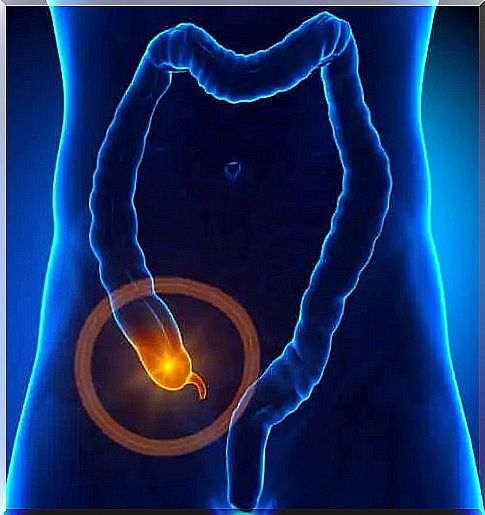Characteristics And Function Of The Appendix

There is a general idea that the appendix is just a remnant of human evolution and is useless. Indeed, the function of this small organ is still unclear to science. However, there is a lot of data that shows that it may not be as useless as I previously thought. What are the characteristics and function of the appendix?
Usually, the appendix is completely ignored until it causes problems, ie when the appendicitis becomes inflamed and appears. We all know that in such cases the patient must undergo surgery to remove the organ.
About 8.6% of men will undergo appendicectomy or appendix removal. The figure is slightly lower for women: 6.7%. No patient thinks they will miss this organ, but it is not that simple.
What is the appendix?
This organ is a small, thin extension located in the large intestine, at a point called the cecum, near the end of the small intestine. It is an extension of the ascending colon and has a length between 7.6 and 12.7 cm.
The name of the appendix is due to its flap appearance. We can say that it looks like a pendulum. It is a kind of worm or tube with an inlet, but no outlet. This is why it can easily accumulate food particles and become inflamed, causing appendicitis.
This organ has always been a mystery to doctors. The organ must have a function if it exists, but the specialists could not find it. It has long been thought that it is simply a remnant of human evolution, destined to disappear over time.

A change of perspective
Despite the predominant ideas, researchers recently found that the appendix evolved 26 times in mammals. That is, it has changed to fit better in the body over the centuries. This does not coincide with the idea that it is useless. If so, why have there been so many adaptations?
Several experts have decided to join forces to investigate the reason for this apparent contradiction. A 2016 study tried to determine what the animals have in common when it comes to the appendix. Specialists analyzed hundreds of mammals, including humans.
The first conclusion they reached was that the appendix had evolved more times than it had disappeared. In other words, there are many more animals that have preserved this organ (with adaptations) than animals that have disappeared. This has led scientists in a surprising way.
New discoveries regarding the function of the appendix
The researchers found that there is a high concentration of lymphatic tissue in the appendix, which serves as protection for the body. This led them to believe that the appendix could play an immune role.
Physiologist Loren Martin of Oklahoma State University noted that the walls of the appendix, especially in children and young adults, contain many lymphatic cells. In his opinion, this turns the appendix into a kind of amygdala of the intestine, similar to the tonsils in the throat. The appendix could be a defensive front against various diseases. Lymphatic cells can exert immune control.
A scientific study seems to confirm this hypothesis, at least in part. According to the findings, people who contracted an infection with Clostridium difficile bacteria were twice as likely to develop a serious condition if they did not have an appendix.
Other interesting facts
The above was not the only conclusion reached by scientists. They currently suspect that the appendix is an important reservoir and refuge for the intestinal microbiota. In fact, this microbiota is the key to the immune system, metabolism and the proper development of certain organs.
It can be altered in various circumstances, such as severe diarrhea. What the researchers assume is that the appendix works as a kind of emergency device. This means that it helps to recover lost microorganisms. Apparently, the microbiota needs more time to recover in similar circumstances to those who have undergone an appendectomy. As you can see, it seems that the function of the appendix is an important one. It’s not as useless as you thought.









